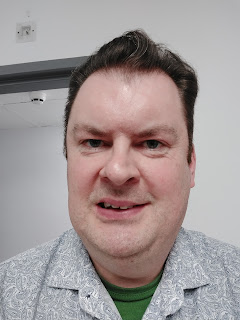Drudwen
I saw them once at Aberystwyth Pier,
before I knew what a murmuration was,
or even that they were starlings,
nevermind their Welsh name, or if they had one.
Again years later near the racecourse
as we walked by the canal.
Today they fly over your garden,
I was going to say like plumes of smoke
from your chiminea, then I see that
in fact it is smoke. When they come
in the other direction they are not camouflaged,
but like tea leaves in glass as the water's poured,
or glitter in a snow globe.
It's not their call you hear
but the flapping of their wings;
not the size of the flock that surprises,
but that of the birds themselves.
Your Second Book
I was never in your house
but often in your car - maroon,
I couldn’t guess the model.
You always left it at the bottom
of the difficult driveway to Pant-y-Nos
so that we could walk and talk
before and after Meeting.
You didn’t go the long way
to Capel Dewi, but I think I liked
your lifts best. I was flattered
you remembered me from the workshop,
I’m sure you meant it when you said
that I wrote some good stuff.
I was glad but not surprised
when I found your first collection
in a bookshop in Hay-on-Wye,
but when years later I came across
your second in Oxfam in York
I almost wished I didn’t have it already,
hadn’t read it several times.
Why couldn’t it have been your third?
I wonder who it belonged to,
where they got it,
why did they give it away?
Had these things been different,
so would this poem have been.
Whether it would have been better,
neither you nor I can say.
Many Mysteries
I’ll never know what colour
the Nigella flowers would have been
or if the seeds ever sprouted
that I sowed in a plastic pot
and put next to the Christmas Rose
my mother placed by your headstone.
I’ll never know if the pot blew away
or if vandals stole it. I wonder
what you’d have thought -
maybe you’d have laughed,
as you did when you heard
that one of the chocolates
in the box you bought my great-aunt
had a beetle inside. You weren't there
when she bit into it, but could just see her,
as I can see you now, looking down
on Christ Church, snoozing, waking up
and saying, what happened to my flowers?
Orange
I never knew which came first -
the colour or the fruit,
like the chicken and the egg.
Nor did I know why we didn’t say carrot,
for I’d never seen a purple carrot,
perhaps not even a blood orange
which is only red inside.
Did I wonder why we didn’t
call lemons yellows, or limes greens?
I knew mustard was a
different shade of yellow,
grass a deeper tone of green.
Blackberries were black
although their juice was not,
and if we said something
was apricot-coloured
we didn’t mean it was orange,
though of course it was.
Coming Back to Iris Murdoch
It's fifteen years since I last read A Word Child.
I take it off the bookshelf and out falls a bookmark
from Endeavour Books. I’d forgotten I bought it in Whitby
that weekend in September I came home.
The novel will always remind me
of my last winter in Lampeter,
in the flat above the Mustard Seed,
as I worked towards my M.A. I little knew then
that when I came to read it again
I’d be the same age as its hero-narrator,
that the book would go with me to Aberystwyth
and then back to Yorkshire, survive four house moves,
the bookmark from Whitby staying inside.
It’s not the lounge or my bedroom where I read it
that I think of, but for some reason that narrow kitchen
where I cooked pesto pasta on dark evenings,
the flavour reminding me of those days
like chocolate does Hilary Burde of his tragic past.
Peter J Donnelly lives in York where he works as a hospital secretary. He has a degree in English Literature and a MA in Creative Writing from the University of Wales Lampeter.
He has been published in various magazines and anthologies
including Dreich and Writer's Egg, and recently won second prize in the Ripon
Poetry Festival Competition.













No comments:
Post a Comment